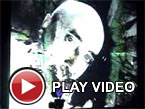April 4-6, 2003, Camber Sands, UK
Zoviet-France were a low key opening with random rumble and drone
rising from abstracted ambience to half realised attempts to scale
walls of noise. They were more varied and engaging when I saw them with
Ryoji Ikeda a few years back. Here they just seemed to be coasting
along blindly and we might as well just have stayed outside with the
car engine running and our heads on the bonnet. The Fall were back on
form hearing nosey telephone thingamebobs listening in and losing
tempers with friends. They had an able new bassist and the young goth
wife of Mark E. Smith diddling about on keyboards. The most vivid
imaged etched from day one is of the Dickensian spectre of Smith
looming through the chain mesh at the stage side. I got into blind
drunk can't-find-my-way-round Smith mode so was totally trashed by
Public Enemy. I do however recall that they played a stormin'
Rebel Without A Pause,
they were a lot of fun and like most anyone with even half a
functioning sense of reason, Chuck D dislikes world-leader-pretend
George Bush intensely.
Somehow I found a hangover cure the next day with my head in Pita's PA
as he stood in red jacketed racing stillness at his laptop, coaxing
huge swathes of digital distortion from which rose funny little buried
three note melodies. Farmersmanual were disappointing compared to
recordings I've heard, but still the kind of glitched abstraction that
makes a good organic lager drinking backdrop. It was hard to give a
damn about them though, and why they needed so many as five laptoppers
to do what they did seemed a mystery. Disjecta's processed guitar
drones actually worked much better further from the stage as background
ambience, and my new frind Eva's main criticism of the event was that
there was too much stuff like this. It was no problem for a hardened
experimentalist like me but veterans of the Shellac curated event last
year were often heard to complain of a lack of guitar bands and
associated energy. That's not a criticism that could be leveled at the
bouncey hand waving high jinx of rappers El-P and Murs. They got a big
cheer for denouncing warmongering stooge Bush, and were so fuckin' on
one that you couldn't help but get carried along by the rush. Yasunao
Tone looked very happy to confuse the techno heads with some random cut
up abstract noise, and Hecker's studious almost non-existant stage
presence and post-Gilbertoid bee buzz proved to be the most room
clearing performance I witnessed. His set was close enough to sounding
like he was playing back his recent Mego CD to beg the question of why
he'd actually bothered to turn up - nice work if you can get it! Earth
cancelled so appropriately Sunn O))) were moved to burn bright in their
position, a slow riff grind of apocalyptic doom that won legions of new
fans. Their mind altering armageddon mogadon skullfuck was most
certainly the highlight of the first day and afterwards Aphex Twin just
seemed like mediocre crowd pleasing mouldy old dough, albeit pleasantly
foot tapping mouldy old dough.
The best day by far was Sunday. Lovely humourous rapid cut ups from Jim
O'Rourke brought a cartoonish feel to the air. His ability to sense
humour in avant soundscapes should not be underestimated. If you ever
get the chance to see such exceptionally life affirming artists as Coil
or the Magic Band, it would be worth traversing a continent for. A new
Coil set was presumably what I would expect to eventually be reformed
into
Music to Play in the Dark 3, with only
The Dreamer Is Still Asleep
in a drastically reworked form as finale to nod to old glory. They put
on an awesome and powerful performance which to me seemed like a ritual
of anti-war magic, with a bearded Balance waggling a long sleeve camply
as the green univarse light show altered minds and etched a spinning
wormhole in so-called reality. I was quite overcome and tears streamed
down my face. These were not tears of sadness or joy, but a body
bursting beyond its threshold. On sale after their set was a new CD
titled
A.N.S. which is the follow up to
Time Machines and is equally exquisitely hallucinogenic. Bernard Parmegiani's
De Natura Sonorum
raised the largest applause noise to crowd size ratio and it was pretty
cool to be able to wander around the half empty hall in and out of the
rushing elegant peaks and troughs as usually electroacoustic concerts
are seated affairs. The Magic Band just owned the place as soon as they
walked on, cool mofos to a man. Opening with Rockette Morton's
Trout Mask
bass solo, they cut a dash through some instrumental renditions that
it'd be hard to believe could've been better back in the day. The sound
was perfect, courtesy of Shellac bassist Bob Weston. Guitarist Gary
'Mantis' Lucas was obviously named such by the Captain due to the
stance he pulled as he worked those difficult shapes into our eager
ears. When John French stalked out from behind his kit to take on a
Beefheart persona and sing a bellyfull o'psychedelic blues, it was a
moment I dreaded just in case it all relapsed into kitsch karaoke
clowning, but nothing could be further from the truth. As he told the
tale of the farmer who pitched the devil from now to now with
The Floppy Boot Stomp,
it was obvious he'd lived so much of this seminal music that he'd
become a different person, and one who could deliver a more than
convincing full on hoodoo hoedown in the Captain's boots. Towards the
end of their joyous set there was a false fire alarm and the room had
to be cleared. I might've found me a woman to hold my big toe until it
was time to go, but nowaday's a woman's gotta hit a man. A few more
songs to a drastically diminished crowd had me leaping about like a kid
waving apples down the front and after the inevitable fiery finale
Big Eyed Beans From Venus
the only reasonable response was to stand in front of the Mantis
shouting, "We love you!" The Magic Band were so great I tripped out to
their show in London the next day, and who should I bump into walking
the nice streets of Wimbledon? None other than Malka Spigel, wife of
WIRE guitarist Colin Newman. Clearly I was about to witness lightning
striking twice!
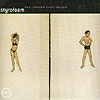 It's quite strange to imagine that there could now very well be ageneration of electronic-based musicians/artists who never sat forhours practicing scales, modes, chords, rhythms, what have you, on anactual instrument. Since the laptop revolution has brought aboutpractically every instrumental sound under the sun for consumption,there's not really a great need to sit with a chunk of wood or brass.Not that I don't favor electronic-based music or the musicians who makeit, but hearing additional sounds that were actually in the ether atsome point before being committed to tape (sorry, hard disk) makes fora refreshing change now and again. I'm What's There to Show That Something's Missing,the latest release from Belgian native Arne van Petegem (aka Styrofoam)enjoyably blends the glitch-type Powerbook beats and sounds with thelive element of prominent vocals and acoustic guitar at times for aninteresting take on modern pop music. "The Long Wait" opens the discwith the arpeggiations of said guitar and builds into a laid backgroove of electronic beats and keyboards that gradually thickens withsome synth bass while van Petegem's lush vocal layers deliver both acatchy melody and lyrics. The more pop-oriented "A Heart Without AMind" skips along to a wall of synth flourishes with the bass line andvocals leading the progressions until guitar and keyboards take over.The opening tape shuttle sounds of the more electronic "Forever, YouSaid Forever" drop out for some sparse keyboards and linear drummachine rhythms to provide the backing track for a sampled conversationof a couple that are in the midst of an arguement over a break-up. Thedisc's eight tunes are well crafted and arranged to highlight vanPetegem's skills as both a programmer and guitar player/vocalist byaugmenting the former with the latter. While this particular formulafor the laptop set is nothing new, Styrofoam's take on it makes for amore animated disc with the likeness of a full band.
It's quite strange to imagine that there could now very well be ageneration of electronic-based musicians/artists who never sat forhours practicing scales, modes, chords, rhythms, what have you, on anactual instrument. Since the laptop revolution has brought aboutpractically every instrumental sound under the sun for consumption,there's not really a great need to sit with a chunk of wood or brass.Not that I don't favor electronic-based music or the musicians who makeit, but hearing additional sounds that were actually in the ether atsome point before being committed to tape (sorry, hard disk) makes fora refreshing change now and again. I'm What's There to Show That Something's Missing,the latest release from Belgian native Arne van Petegem (aka Styrofoam)enjoyably blends the glitch-type Powerbook beats and sounds with thelive element of prominent vocals and acoustic guitar at times for aninteresting take on modern pop music. "The Long Wait" opens the discwith the arpeggiations of said guitar and builds into a laid backgroove of electronic beats and keyboards that gradually thickens withsome synth bass while van Petegem's lush vocal layers deliver both acatchy melody and lyrics. The more pop-oriented "A Heart Without AMind" skips along to a wall of synth flourishes with the bass line andvocals leading the progressions until guitar and keyboards take over.The opening tape shuttle sounds of the more electronic "Forever, YouSaid Forever" drop out for some sparse keyboards and linear drummachine rhythms to provide the backing track for a sampled conversationof a couple that are in the midst of an arguement over a break-up. Thedisc's eight tunes are well crafted and arranged to highlight vanPetegem's skills as both a programmer and guitar player/vocalist byaugmenting the former with the latter. While this particular formulafor the laptop set is nothing new, Styrofoam's take on it makes for amore animated disc with the likeness of a full band.


 There's a long list of albums with titles that are misnomers for the music inside. With Summer Sun,Yo La Tengo are pretty close to adding another to the list. Severaltracks interspersed save the album from this category by shining alittle light in, though the band generally gets mired in theirexquisitely somber sound, which is a very good thing. Album afteralbum, Yo La Tengo produce quality music with impressive productionvalues, and this album is no different. The proceedings start, as morethan one Yo La Tengo album has, with an instrumental of sorts, and"Beach Party Tonight" is a clear indication that the electronic side ispossessing the band more and more on each release. The whole albumfeatures more technology, and these additions lend a lot to the generalaura of the music without being intrusive. Ira Kaplan's vocals arefrequently hushed, as usual, and on "Beach Party," they're almostincomprehensible, bringing the music to the forefront. Georgia Hubleyis coming into her own vocally, sounding more and more like thechanteuse that's been hiding away. "Little Eyes" is a perfect power popproduction, much like the more mainstream fair of I Can Hear the Heart Beating as One.Elsewhere the tradition of one epic song per album continues, too, with"Let's Be Still" as this album's "Night Falls on Hoboken," and it's abit more coherent and a bit more freeform than before. One thing thatthe title suggests clearly, though, is that Yo La Tengo were out tohave a lot more fun this time, and it shows on tracks like "Georgia vs.Yo La Tengo," an almost '70s porn anthem laden with effects and funkpiano, and on "Winter A-Go-Go", which could almost pass for Steve andEydie. Even though there's more sun in the sky, there's always shadowscast, and that's what they thankfully couldn't avoid. Summer Sunis not their best work, but it is another solid album from a band notafraid to expand their sound, take chances or let loose every now andthen.
There's a long list of albums with titles that are misnomers for the music inside. With Summer Sun,Yo La Tengo are pretty close to adding another to the list. Severaltracks interspersed save the album from this category by shining alittle light in, though the band generally gets mired in theirexquisitely somber sound, which is a very good thing. Album afteralbum, Yo La Tengo produce quality music with impressive productionvalues, and this album is no different. The proceedings start, as morethan one Yo La Tengo album has, with an instrumental of sorts, and"Beach Party Tonight" is a clear indication that the electronic side ispossessing the band more and more on each release. The whole albumfeatures more technology, and these additions lend a lot to the generalaura of the music without being intrusive. Ira Kaplan's vocals arefrequently hushed, as usual, and on "Beach Party," they're almostincomprehensible, bringing the music to the forefront. Georgia Hubleyis coming into her own vocally, sounding more and more like thechanteuse that's been hiding away. "Little Eyes" is a perfect power popproduction, much like the more mainstream fair of I Can Hear the Heart Beating as One.Elsewhere the tradition of one epic song per album continues, too, with"Let's Be Still" as this album's "Night Falls on Hoboken," and it's abit more coherent and a bit more freeform than before. One thing thatthe title suggests clearly, though, is that Yo La Tengo were out tohave a lot more fun this time, and it shows on tracks like "Georgia vs.Yo La Tengo," an almost '70s porn anthem laden with effects and funkpiano, and on "Winter A-Go-Go", which could almost pass for Steve andEydie. Even though there's more sun in the sky, there's always shadowscast, and that's what they thankfully couldn't avoid. Summer Sunis not their best work, but it is another solid album from a band notafraid to expand their sound, take chances or let loose every now andthen.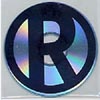 Replicator are a neat dynamic rock trio from the San Francisco Bay Area who get compared to Shellac a lot. This seems to be mostly because Shellac bassist Bob Weston records them and because they are quite vocal on the Shellac email list, which is how I happened to hear about them. To me a much better comparison would be Poster Children, but imagine how they might have ended up had they introduced the loops and synths of Salaryman into their exuberant rockpop shapes instead of separating into two different projects involving the same people.
Replicator are a neat dynamic rock trio from the San Francisco Bay Area who get compared to Shellac a lot. This seems to be mostly because Shellac bassist Bob Weston records them and because they are quite vocal on the Shellac email list, which is how I happened to hear about them. To me a much better comparison would be Poster Children, but imagine how they might have ended up had they introduced the loops and synths of Salaryman into their exuberant rockpop shapes instead of separating into two different projects involving the same people. Lately it seems Mark Eitzel has just been taking opportunities as they come. He was invited to record albums in Chicago and Athens, served a month long residency at the Knitting Factory in NYC and will soon tour Portugal and Spain. 'The Ugly American' is the result of the trip to Greece and the debut album from the UK's Tongue Master (a U.S. release date is likely for June or July via Thirsty Ear).
Lately it seems Mark Eitzel has just been taking opportunities as they come. He was invited to record albums in Chicago and Athens, served a month long residency at the Knitting Factory in NYC and will soon tour Portugal and Spain. 'The Ugly American' is the result of the trip to Greece and the debut album from the UK's Tongue Master (a U.S. release date is likely for June or July via Thirsty Ear).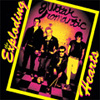 The Exploding Hearts are unabashed disciples of the vibrant,inescapably catchy power pop of bands like The Knack and The Nerves.Mixing the thrust of early punk with the melodic sensibilities ofsixties results in a spirited, irresistible product with a sharp edge.It's evident throughout Guitar Romantic that it isn't a pose, nor is it a joke. These are guys who are on their third or fourth copy of Singles Going Steadycause they wore them out, who wondered what Brian Wilson might havesounded like if he met up with Richard Hell, who know the value of agood, steady finger snap and aren't afraid to use it. This is the musicthey love and it is that passion that makes Guitar Romanticsuch an engaging listen. Don't think that because they pay homage to somany of their influences that there is nothing new on this record. Infact, the Exploding Hearts bring a ferocious energy to their sound,charging headfirst into a crunchy rocker, or soulfully crooning alongwith a backup harmony. "Modern Kicks" opens things up, digging rightin, and guaranteeing that you'll stick around for the rest of album.The lead guitar slices through the fuzzed out production that causesthe instruments to blur and rattle around each other. The mix gives adirty, vintage sound that adds to the personality of the music. Itsounds as if the album had slipped behind a shelf or under a pile ofrecords twenty years ago, only to be rediscovered today as a lost popgem. The bright shuffle of "Sleeping Aids and Razorblades" carries theHearts' soulful romantic persona with clever lyrics like "it's a littleupbeat / and it ain't in tune / you know it's just like this heart ofmine." That line could serve as the tagline for Guitar Romantic,as the Hearts cover the trials and troubles of teenage romance with theresiliently forlorn attitude they deserve, all packaged in a blissfullysweet pop delivery. "Jailbird," a love song about sniffing glue, has adevastatingly hooky chorus, amplified by the call and response backupvocals and a 120 watt guitar melody. You'll find yourself followingalong with every "Yeah, Yeah" and "Woah, Woah." There truly is not aweak song on the entire album. Each track is irresistibly catchy andafter a brief ten songs in twenty-eight minutes, the desire for anotherfix is intense. Guitar Romantic could have easily become justanother nostalgia act looking to knock off the past, but this is farfrom the case. They bring their own tack to a familiar style, imbuingit with a newfound youth and soul. The energy and vitality that theExploding Hearts put out is stunning, their music finely crafted topound even the most jaded music fan into grinning, head bouncingsubmission.
The Exploding Hearts are unabashed disciples of the vibrant,inescapably catchy power pop of bands like The Knack and The Nerves.Mixing the thrust of early punk with the melodic sensibilities ofsixties results in a spirited, irresistible product with a sharp edge.It's evident throughout Guitar Romantic that it isn't a pose, nor is it a joke. These are guys who are on their third or fourth copy of Singles Going Steadycause they wore them out, who wondered what Brian Wilson might havesounded like if he met up with Richard Hell, who know the value of agood, steady finger snap and aren't afraid to use it. This is the musicthey love and it is that passion that makes Guitar Romanticsuch an engaging listen. Don't think that because they pay homage to somany of their influences that there is nothing new on this record. Infact, the Exploding Hearts bring a ferocious energy to their sound,charging headfirst into a crunchy rocker, or soulfully crooning alongwith a backup harmony. "Modern Kicks" opens things up, digging rightin, and guaranteeing that you'll stick around for the rest of album.The lead guitar slices through the fuzzed out production that causesthe instruments to blur and rattle around each other. The mix gives adirty, vintage sound that adds to the personality of the music. Itsounds as if the album had slipped behind a shelf or under a pile ofrecords twenty years ago, only to be rediscovered today as a lost popgem. The bright shuffle of "Sleeping Aids and Razorblades" carries theHearts' soulful romantic persona with clever lyrics like "it's a littleupbeat / and it ain't in tune / you know it's just like this heart ofmine." That line could serve as the tagline for Guitar Romantic,as the Hearts cover the trials and troubles of teenage romance with theresiliently forlorn attitude they deserve, all packaged in a blissfullysweet pop delivery. "Jailbird," a love song about sniffing glue, has adevastatingly hooky chorus, amplified by the call and response backupvocals and a 120 watt guitar melody. You'll find yourself followingalong with every "Yeah, Yeah" and "Woah, Woah." There truly is not aweak song on the entire album. Each track is irresistibly catchy andafter a brief ten songs in twenty-eight minutes, the desire for anotherfix is intense. Guitar Romantic could have easily become justanother nostalgia act looking to knock off the past, but this is farfrom the case. They bring their own tack to a familiar style, imbuingit with a newfound youth and soul. The energy and vitality that theExploding Hearts put out is stunning, their music finely crafted topound even the most jaded music fan into grinning, head bouncingsubmission. 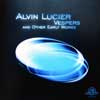 These five Lucier pieces dating from 1961 to 1970 provide handyillustrations of my love-hate relationship with American academicmusic. Its central Theory versus Music dialectic is interesting. Is thetheory on which music is based important? If so, to whom? If a CD makesno sense aesthetically or otherwise until the liner notes are read (andthe liner notes are in this elevated domain unquestionably important)what does that say about the music? Does the pleasure of listeningdepend on the theory or should the pleasure be sought in the theoryitself? The first illustration on this CD is "Vespers" (1969) whichinvolves performers moving around a given acoustic space withdirectional pulse generators. I liked the piece before I read the notesbut I find it makes even more interesting listening how that I have.The piece demonstrates the theory that humans perceive physical spacethrough our sense of hearing. Without the theory, it's fifteen minutesof attractive clicking sounds but with the theory the listener becomesconsciously involved by providing and operating the apparatus for theperceptual half of the experiment, which can lead to deeperunderstanding and pleasure—it's rather like having impressionistpainting explained to you for the first time. Implication: theory canenhance music. "Chambers" (1968) illustrates another point; beforereading my response was: sounds okay, nice enough. It involves variousrecordings of sound spaces, such as a railway station, cafeteria orwhat-have-you, playing on portable devices, disguised in some kind ofwrapping, that are placed within the performance sound space—thuschambers (i.e. acoustic spaces) within chambers. Now that's fine andperhaps even witty, in a rather twee academic way, but grasping theconcept doesn't improve the listening experience and I'm beginning toget annoyed by the suggestion that the concept is even relevant to me.Implication: theory doesn't always enhance music and can detract. Onyet another hand, "North American Time Capsule" (1967), a performanceon the archaic Sylvania encrypting voice encoder without thecorresponding decoder, is unlistenable with or without the various deepand interesting levels of meaning provided by its associated theory.Implication: theory cannot enhance bad music. "(Middletown) MemorySpace" (1970) is scripted thus: a number of singers and/orinstrumentalists go out into a city and "record, by anymeans—electronic recording, graphic notation, or memory—the sounds ofthe city," return and "re-create, solely my means of your voices andinstruments and with the aid of memory devices (without additions,deletions, improvisation, interpretation) those outside soundsituations." On this performance the music sounds like rather dullimprov. Contemplating the composition (i.e. the instructions) providesa better distraction than the music: can it be done?; does it matter atall if it can't?; is the absurd impossibility of the parenthetical"without" clause another joke?; is this what group improv sounds likewhen exerting personality and thus interaction is explicitlyforbidden?; what must it be like to be paid to think about thesethings? And there we have, I fear, the crucible of my irritation:jealousy. These Cagian exercises must surely be great fun for thecomposer and may even be pleasing for the performers but the disregardfor whether or not the music will be any good to listen to is a littleirksome to the mere audience member. The implication is that composingand being a composer is more important than being a listener, eventhough the former is existentially dependent on the latter (composingfor its own sake has little to do with music). Such elitism isjustifiable and I am thankful for it when the resulting art is good andvaluable. But when it is not, which is not the exceptional case inAmerican academic music, I find that I cannot discard it without envy.
These five Lucier pieces dating from 1961 to 1970 provide handyillustrations of my love-hate relationship with American academicmusic. Its central Theory versus Music dialectic is interesting. Is thetheory on which music is based important? If so, to whom? If a CD makesno sense aesthetically or otherwise until the liner notes are read (andthe liner notes are in this elevated domain unquestionably important)what does that say about the music? Does the pleasure of listeningdepend on the theory or should the pleasure be sought in the theoryitself? The first illustration on this CD is "Vespers" (1969) whichinvolves performers moving around a given acoustic space withdirectional pulse generators. I liked the piece before I read the notesbut I find it makes even more interesting listening how that I have.The piece demonstrates the theory that humans perceive physical spacethrough our sense of hearing. Without the theory, it's fifteen minutesof attractive clicking sounds but with the theory the listener becomesconsciously involved by providing and operating the apparatus for theperceptual half of the experiment, which can lead to deeperunderstanding and pleasure—it's rather like having impressionistpainting explained to you for the first time. Implication: theory canenhance music. "Chambers" (1968) illustrates another point; beforereading my response was: sounds okay, nice enough. It involves variousrecordings of sound spaces, such as a railway station, cafeteria orwhat-have-you, playing on portable devices, disguised in some kind ofwrapping, that are placed within the performance sound space—thuschambers (i.e. acoustic spaces) within chambers. Now that's fine andperhaps even witty, in a rather twee academic way, but grasping theconcept doesn't improve the listening experience and I'm beginning toget annoyed by the suggestion that the concept is even relevant to me.Implication: theory doesn't always enhance music and can detract. Onyet another hand, "North American Time Capsule" (1967), a performanceon the archaic Sylvania encrypting voice encoder without thecorresponding decoder, is unlistenable with or without the various deepand interesting levels of meaning provided by its associated theory.Implication: theory cannot enhance bad music. "(Middletown) MemorySpace" (1970) is scripted thus: a number of singers and/orinstrumentalists go out into a city and "record, by anymeans—electronic recording, graphic notation, or memory—the sounds ofthe city," return and "re-create, solely my means of your voices andinstruments and with the aid of memory devices (without additions,deletions, improvisation, interpretation) those outside soundsituations." On this performance the music sounds like rather dullimprov. Contemplating the composition (i.e. the instructions) providesa better distraction than the music: can it be done?; does it matter atall if it can't?; is the absurd impossibility of the parenthetical"without" clause another joke?; is this what group improv sounds likewhen exerting personality and thus interaction is explicitlyforbidden?; what must it be like to be paid to think about thesethings? And there we have, I fear, the crucible of my irritation:jealousy. These Cagian exercises must surely be great fun for thecomposer and may even be pleasing for the performers but the disregardfor whether or not the music will be any good to listen to is a littleirksome to the mere audience member. The implication is that composingand being a composer is more important than being a listener, eventhough the former is existentially dependent on the latter (composingfor its own sake has little to do with music). Such elitism isjustifiable and I am thankful for it when the resulting art is good andvaluable. But when it is not, which is not the exceptional case inAmerican academic music, I find that I cannot discard it without envy. 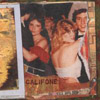 This is proof that a band can combine a number of different musicalgenres into an album and still have it be as beautiful as it isinteresting. Country and folk roots, good ol' fashioned rock, blues,and sound collages all fit together quite nicely and summon spiritsboth old and new with outstanding results. Califone's Quicksand/Cradlesnakesdoesn't have a single wasted note on it. Electric and acousticinstrumentation fit together like pieces of a musical puzzle few othershave been able to solve; tape loops of broken, stringed instruments,computer beeps and bloops, and spiraling machine noise slideeffortlessly into and alongside country-tinged ballads full oflamenting pianos and dancing guitars. A perfect example of this lovelycombination is "Horoscopic.Amputation.Honey.," where buzzing guitarsshift in and out of mix that includes wooden, rattling percussion, whatsounds like a type-writer, and twangy acoustic guitar. Tim Rutili'svoice plays a big part in the music, too. At times his voice is sweetand soft like a lullaby and elsewhere it is bold and full of attitude.The rebellious and edgey "Your Golden Ass" is full spicey vocals,surreal lyrics, grimy guitar, and steel drums that somehow fit in witheverything else. The primitive and nervous "(Red)" makes me feel likeI'm in the middle of an almost-deserted and very dangerous townsomewhere in a vast desert and "When Leon Spinx Moved Into Town" is asexy, albeit quiet, rock tune blossoming with southern spices and atension that is hard to identify, but is looming and menacing in a verysinister way. The entire album is lavished with images and emotionsthat leave no room for dull moments. Califone has given birth to onehell of a fine rock album; it is diverse, full of lovely songs, andjust plain fun to listen to.
This is proof that a band can combine a number of different musicalgenres into an album and still have it be as beautiful as it isinteresting. Country and folk roots, good ol' fashioned rock, blues,and sound collages all fit together quite nicely and summon spiritsboth old and new with outstanding results. Califone's Quicksand/Cradlesnakesdoesn't have a single wasted note on it. Electric and acousticinstrumentation fit together like pieces of a musical puzzle few othershave been able to solve; tape loops of broken, stringed instruments,computer beeps and bloops, and spiraling machine noise slideeffortlessly into and alongside country-tinged ballads full oflamenting pianos and dancing guitars. A perfect example of this lovelycombination is "Horoscopic.Amputation.Honey.," where buzzing guitarsshift in and out of mix that includes wooden, rattling percussion, whatsounds like a type-writer, and twangy acoustic guitar. Tim Rutili'svoice plays a big part in the music, too. At times his voice is sweetand soft like a lullaby and elsewhere it is bold and full of attitude.The rebellious and edgey "Your Golden Ass" is full spicey vocals,surreal lyrics, grimy guitar, and steel drums that somehow fit in witheverything else. The primitive and nervous "(Red)" makes me feel likeI'm in the middle of an almost-deserted and very dangerous townsomewhere in a vast desert and "When Leon Spinx Moved Into Town" is asexy, albeit quiet, rock tune blossoming with southern spices and atension that is hard to identify, but is looming and menacing in a verysinister way. The entire album is lavished with images and emotionsthat leave no room for dull moments. Califone has given birth to onehell of a fine rock album; it is diverse, full of lovely songs, andjust plain fun to listen to.  Occasionally there is a song which comes along that is so damnedexciting time just plain stops for three minutes and 14 seconds. Theexperience of hearing Sharon Jones' cover of Janet Jackson's "What HaveYou Done for Me Lately" on the local college radio waves has beenabsolutely maddening. Perhaps the novelty of a soul revival outfitdoing a 1980s cover tune in 1960s funk style was enough to get thissong noticed, but once it's heard, it's damned addictive. No matter ifI was stuck in traffic behind dildos on mobile phones or getting up andready for work, the world truly did feel like a great place to be whenthis song came on. Hearing the album in full now is nothing less than adivine reward. It's safe to say that the energy captured by Jones andthe Dap Kings througout the entire record is equally as feverish andunstoppable as the single, and after countless listens it's not losingone bit of the charm. Dap-Dippin'is the first full-length for NYC-based Daptone Records (founded in thewake of the demise of Desco records) and collects a number of the songsfrom various 7" singles released by Jones over the last couple years.Recently, the singles and albums seem to be popping up in bizarreplaces and catching on to those both curious and adventurous enough togive it a try, and rightfully so. The music is a fantastic tribute tothe untainted sound of years long gone, presented in living mono andskillfully produced with an ensemble of talented musicians to give it alive in-studio production feeling that bands HAD to get right backbefore multitracking was affordable. Jones, a former session vocalistand the singer occasionally known as Miss Lafaye, fronts the groupthrough ten songs of unchained vigor with the saucy attitude of themost famous funk frontmen and the seasoned grace of a lady who knowsher shit. The real leader however seems to be Bosco Mann, bassist forthe Sugarman 3 and probably a member of a number of Daptone (andformerly Desco) in-house bands. Dap-Dippin' tactfully has theelements which usually contractually made up a late 1960s vocal soulrecord, with the live clip for the introduction, the high energy hitsingles (like "Got a Thing on My Mind" and "Got to be the Way it Is,")the ballad ("Make it Good to Me") and the tunes with the instrumentalbreakdowns for the band to show off and the listeners to get down("Pick it Up, Lay it in the Cut"). I hate to admit that it may besomewhat formulaic but I will stand by my claim that it is undeniablyfun.
Occasionally there is a song which comes along that is so damnedexciting time just plain stops for three minutes and 14 seconds. Theexperience of hearing Sharon Jones' cover of Janet Jackson's "What HaveYou Done for Me Lately" on the local college radio waves has beenabsolutely maddening. Perhaps the novelty of a soul revival outfitdoing a 1980s cover tune in 1960s funk style was enough to get thissong noticed, but once it's heard, it's damned addictive. No matter ifI was stuck in traffic behind dildos on mobile phones or getting up andready for work, the world truly did feel like a great place to be whenthis song came on. Hearing the album in full now is nothing less than adivine reward. It's safe to say that the energy captured by Jones andthe Dap Kings througout the entire record is equally as feverish andunstoppable as the single, and after countless listens it's not losingone bit of the charm. Dap-Dippin'is the first full-length for NYC-based Daptone Records (founded in thewake of the demise of Desco records) and collects a number of the songsfrom various 7" singles released by Jones over the last couple years.Recently, the singles and albums seem to be popping up in bizarreplaces and catching on to those both curious and adventurous enough togive it a try, and rightfully so. The music is a fantastic tribute tothe untainted sound of years long gone, presented in living mono andskillfully produced with an ensemble of talented musicians to give it alive in-studio production feeling that bands HAD to get right backbefore multitracking was affordable. Jones, a former session vocalistand the singer occasionally known as Miss Lafaye, fronts the groupthrough ten songs of unchained vigor with the saucy attitude of themost famous funk frontmen and the seasoned grace of a lady who knowsher shit. The real leader however seems to be Bosco Mann, bassist forthe Sugarman 3 and probably a member of a number of Daptone (andformerly Desco) in-house bands. Dap-Dippin' tactfully has theelements which usually contractually made up a late 1960s vocal soulrecord, with the live clip for the introduction, the high energy hitsingles (like "Got a Thing on My Mind" and "Got to be the Way it Is,")the ballad ("Make it Good to Me") and the tunes with the instrumentalbreakdowns for the band to show off and the listeners to get down("Pick it Up, Lay it in the Cut"). I hate to admit that it may besomewhat formulaic but I will stand by my claim that it is undeniablyfun.  Armed with insomnia, a handful of members from the Godspeed family, and some egregiously long song titles, Set Fire To Flames oscillate only between dark minimalist music to moderately fleshed out instrumentals. Though Set Fire To Flames does not stimulate the same fiercely glorified feeling as Godspeed, they are able to elicit a more subtle response in some of their songs which has the potential to be no less rewarding. Most of the time, though, this sensation is a little more evasive, and the rewards a little more oblique.
Armed with insomnia, a handful of members from the Godspeed family, and some egregiously long song titles, Set Fire To Flames oscillate only between dark minimalist music to moderately fleshed out instrumentals. Though Set Fire To Flames does not stimulate the same fiercely glorified feeling as Godspeed, they are able to elicit a more subtle response in some of their songs which has the potential to be no less rewarding. Most of the time, though, this sensation is a little more evasive, and the rewards a little more oblique.